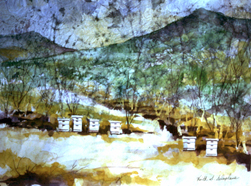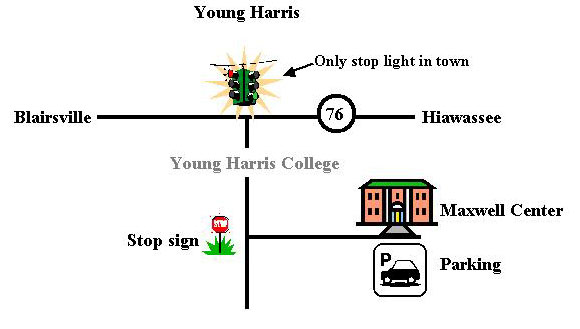2005 Beekeeping Institute
 May 19-21, 2005
May 19-21, 2005
Young Harris College
Young Harris, Georgia
Young Harris College and the University of Georgia are offering the fourteenth annual Beekeeping Institute, May 19-21, 2005. Since its inception in 1992, the Institute has grown to become the largest and most comprehensive beekeeping educational event in the Southeast, offering classes and workshops for beekeepers at all levels of experience and sponsoring the Georgia Master Beekeeper Program (GMBP). For 2005 we are continuing the tradition of well-rounded instruction for beekeepers at every level of experience.
| We are happy to report that for 2005 we are returning to Young Harris College campus. Thanks to Towns County High School for hosting the 2004 event during Young Harris renovations. |
The Institute proper, Friday and Saturday, features a 2-track system – one track for experienced beekeepers and another for beginners. Facility limitations force us to cap enrollment at 150. If you cannot pre-register, please call first to make sure there's space before you make the trip.
Participants in the experienced track will have a special opportunity to consider pollination on a commercial scale. With hive rental prices hovering around $100, the California almond market has never looked better for beekeepers in the Southeast. Dr. Eric Mussen from the University of California will be on the program to tell you everything you need to know to get a piece of this action. For those interested in staying closer to home, Dr. Mike Stanghellini from Rutgers University in New Jersey will give a primer on pollinating regional crops, including the lucrative cranberry markets up the east coast.
Thursday May 19 is dedicated to training and certification examinations for the GMBP Journeyman and Master levels and the Welsh Honey Judge qualification. Training and certification for the GMBP Certified level are incorporated into the normal activities for the beginners' track Friday. Details for both programs are included in this brochure.
The Institute faculty represent a diverse cross-section of bee experience ranging from university academicians to extension agents, hobbyists to seasoned honey producers. Institute participants are encouraged to bring a full slate of questions and take advantage of the assembled expertise.
One of the most rewarding opportunities of the Institute is the annual Honey Show. Besides typical categories in honey, the Honey Show includes classes in photography, art, candles, section comb honey, mead, and beekeeping gadgets. We strongly urge students to participate in the Institute Honey Show, even if it is your first time at competing. Cash prizes are given to winners.
All awards and certifications are announced at the Closing Convocation on Saturday.
We look forward to seeing you at the 2005 Beekeeping Institute!
THURSDAY, May 19
Thursday is dedicated for those wishing to qualify for Journeyman, Master Beekeeper, or Welsh Honey Judges' Certifications.
Morning Sessions (separate and synchronous) |
||
| 8:00 | Journeyman training lectures | Master training lectures |
| 9:45 | Break |
|
| 10:15 | Journeyman training lectures | Master training lectures |
| 12:00 | Lunch |
|
Afternoon Sessions (separate and synchronous) |
||
| 1:00-4:30 | Journeyman Practical Examinations | Master Practical Documentation Audits |
| 3:00-4:30 | Welsh Honey Judges' training lectures | |
| 5:00 | Dinner |
|
| 7:00-9:00 | Welsh Honey Judges' Examination and Audits | Journeyman and Master Written Examinations |
FRIDAY, May 20
7:00 |
Registration begins |
|
||
|
|
|
|
|
|
|
|
|
|
|
|
|
|
|
|
|
|
|
|
|
|
|
|
Afternoon Workshops
Beginners' Track |
Experienced Track |
|
|
|
|
|
|
|
|
|
IPM Theory, Practice, & Economics, Jamie Ellis |
|
|
Optional time: (1) break or (2) honey pollen analysis available, Paul Arnold |
||
|
|
|
|
SATURDAY, May 21
7:00 |
Registration begins |
Morning Lectures |
||
|
Beginners' Track |
Experienced Track |
|
|
|
|
|
|
|
|
|
10:00 |
|
|
|
|
|
|
|
|
12:00 |
|
|
Afternoon Workshops
Beginners' Track |
Experienced Track |
|
|
|
|
|
|
|
|
|
IPM Theory, Practice, & Economics, Jamie Ellis |
|
|
COURSE INSTRUCTORS
Dr. Paul Arnold is Professor of Biology at Young Harris College and co-founder and host of the Beekeeping Institute. A botanist, Paul brings to the Institute a special expertise in honey plants and their pollen.
Jennifer Berry is Apicultural Research Coordinator and Apiary Manager at the University of Georgia. Jennifer's research has been published in American Bee Journal, Annals of the Entomological Society of America, and Journal of Apicultural Research. She is actively involved in all aspects of bee research and education at UGA.
Robert Brewer is Towns County Extension Director with the University of Georgia Cooperative Extension Service. Robert is a co-founder of the Beekeeping Institute and Coordinator of the Georgia Master Beekeeper program.
Dr. Keith Delaplane is Professor of Entomology at the University of Georgia and co-founder of the Beekeeping Institute. A beekeeper of 30 years, Keith's research and extension work is focused on mite control and pollination.
Amanda Ellis is a PhD student under the direction of Dr. Delaplane. Her MS degree was in wildlife ecology at Rhodes University in South Africa. Her dissertation will address effects of bee parasites on bee pollination and foraging ecology.
Dr. James Ellis is a post-doctoral research fellow at the University of Georgia. A 2000 graduate of UGA, Jamie received his PhD from Rhodes University in South Africa. His research involves the biology of honey bee nest invaders.
Keith Fielder is Putnam County Extension Coordinator and is repeating his popular workshop on beekeeping equipment.
Rose Anne Fielder is an accomplished beeswax artist from Putnam County.
Dr. Eric Mussen is Extension Apiculturist at the University of California, Davis campus. Eric is a graduate of the University of Minnesota and chief spokesman for the California almond pollination circuit – one of the most complex and successful pollination industries in the world.
Bill Owens is President of the Georgia Beekeepers Association, past-president of the Eastern Piedmont Beekeepers Association, and occasional lab assistant for the UGA bee program.
Dr. Mike Stanghellini is Post-Doctoral Research Associate at the Marucci Center for Blueberry and Cranberry Research and Extension, Rutgers University. A graduate of North Carolina State University, Mike has broad research experience in crop pollination and alternative pollinators.
PN & Evelyn Williams are founding officers of Tara Beekeepers Association in Forest Park and chief organizers of Tara's annual Beekeeping Shortcourse in Clayton County. The Williams are constantly promoting beekeeping and helping beginners.
GEORGIA MASTER BEEKEEPER PROGRAM
In 2005 the Georgia Master Beekeeper Program (GMBP) is offering qualifications at the Certified, Journeyman, and Master levels. Training and examinations for the Certified (entry) level are incorporated into the Beginners' track on Friday; the higher levels are covered on Thursday.
Applicants to either level are asked to check their intention on the registration form. Questions about the program may be addressed to GMBP director Robert Brewer at (706) 896-2024.
| Exam questions are drawn from Institute lectures as well as topical outlines on the website. *Students are expected to have studied materials on the website prior to sitting for exams. For these and other details about the Master Beekeeper program go HERE. Aspirants to the Journeyman or Master levels must meet advance requirements, including prerequisite certifications, minimum years of experience, documented public service credits, and/or documented expertise in at least five of 17 subspecialties. Bring all required documentation with you for scheduled audits.. |
WELSH BEE KEEPERS ASSOCIATION CERTIFICATION
The Welsh Bee Keepers Association has partnered with the YHC/UGA Beekeeping Institute to offer training and certification for honey show judges. This is the only partnership of its kind between the USA and United Kingdom. Entry-level students are given opportunity during the Institute to complete the first two of four requirements. The Welsh Honey Judge certification requires (1) attendance at the Thursday training, (2) documented experience as a steward (judge's assistant), (3) documented experience as a senior honey show judge, and (4) successful completion of the oral examination. For most aspirants this sequence requires one or more years. The oral examination is offered for those candidates meeting all other requirements. The purchase of an official judge's smock and hat is required of those candidates ready to take the exam, and certified judges, when serving as judge or steward, are expected to wear their official uniforms in respect of the high standards of professionalism the certification implies. Questions about the program may be addressed to Robert Brewer at (706) 896-2024.
HONEY SHOW
Students are strongly encouraged to participate in the Honey Show. Cash prizes are awarded on the following basis: First place winners by class ($50), second place ($40), third place ($30), Best of Show ($100). Winners must be present at Closing Convocation to receive cash prizes.
GENERAL RULES
- Only registered Institute participants may enter.
- Judges and stewards are excluded from competition.
- Institute reserves the right to limit the number of entries on a first-come, first-admitted basis.
- There are fifteen show classes: (1) extracted honey light, (2) amber, (3) dark, (4) chunk honey, (5) cut-comb, (6) creamed honey, (7) mead sweet, (8) mead dry, (9) beeswax cake (a single molded piece of two pounds or more), (10) candle straight (poured or dipped), (11) candle ornamental, (12) beeswax ornaments, (13) original bee-related photography, (14) original bee-related art, and (15) beekeeping gadgets. Contestant may enter in any or all classes but may enter only once per class.
- All honey and beeswax entries must have been produced by the submitter and within the last 12 months. This restriction does not apply to entries in mead, photography, art, and gadgets.
- All entries for honey and candles must be submitted in triplicate: i.e., three matching jars of honey, three boxes of cut-comb, or three candles.
- Submit extracted honey in standard one-pound queenline jars; either plastic or glass is acceptable.
- Submit chunk honey in standard one-pound chunk honey jars with wide mouths and straight sides. Insert only one piece of comb in jar.
- Beeswax entries must be pure beeswax.
- Art and photography must be presented in a self-standing frame, and each accompanied with a 3 x 5 card giving the title, artist, and brief "story" behind the piece.
- Do not label products in any way; an identifying code sticker will be assigned to your entry at registration.
- All entries must be submitted by 12:00 noon, Friday, May 20.
- Judging criteria are selected at the discretion of Judge, and decision of Judge is final.
LODGING
Excellent lodging is available at motels in Young Harris, Hiawassee, and Blairsville. Please contact directly one of the numbers listed below to make your reservations.
Young Harris Motel, Young Harris (706) 379-3136
Brasstown Valley Crowne Plaza Resort, Young Harris (706) 379-9900
Fieldstone Inn, Hiawassee (706) 896-2262
Lake Chatuge Lodge, Hiawassee (706) 896-5253
Mull Motel, Hiawassee (706) 896-4195
Salale Lodge, Hiawassee (706) 896-3943
Holiday Inn Express, Hiawassee (706) 896-8884
Holiday Inn Express, Blairsville (706) 745-6844
Seasons Inn, Blairsville (706) 745-1631
Best Western Inn, Blairsville (706) 745-6995
El Joe Lodge, Blairsville (706) 745-6991
Chamber of Commerce (can give listings for cabins, bed & breakfasts, etc.) (800) 984-1543
MEALS are available at the Young Harris College cafeteria for $5.00-7.00 per person, payable at the door; cafeteria serves breakfast, lunch, and dinner. It opens Friday morning and closes Saturday evening. Students are also free to visit local restaurants.
MAP TO YOUNG HARRIS

